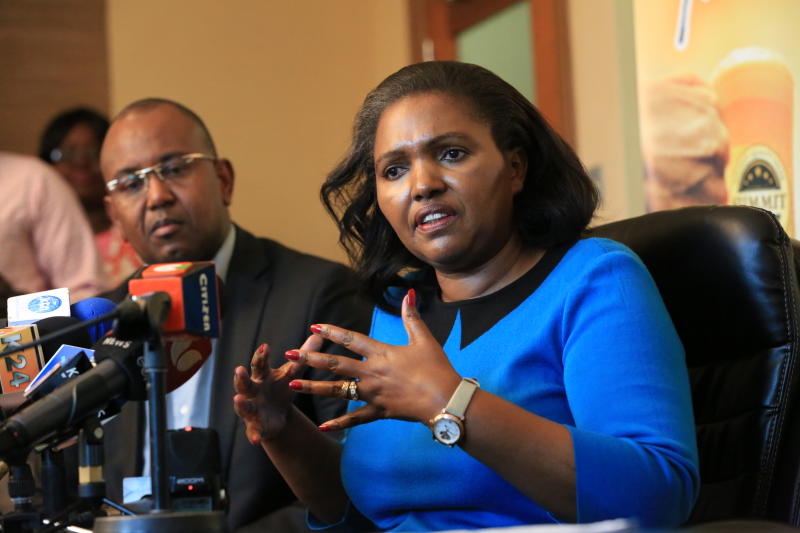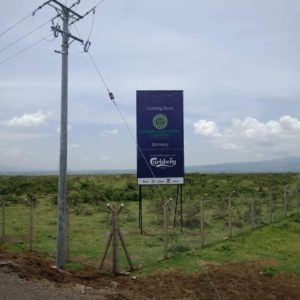Business
Scramble For Naivasha: Of Keroche And Danish Brewing Company

Keroche and KRA are entangled in a fierce war. The KRA is set to collect Sh9.1 billion in taxes from Keroche Breweries Limited with regard to products manufactured and marketed by the company. This follows a win by the KRA in six appeals filed by Keroche before the Tax Appeals Tribunal in 2015 and 2017, respectively.
Experts have already warned that the huge cash demand could send the only surviving indigenous brewer hurtling down the precipice.
While Tabitha would be moving to court to challenge the tribunal’s decision, KRA has moved quickly to freeze her banks accounts thereby freezing the operations of the company.
At a time when unemployment rates in Kenya are at an all time high, its immoral for KRA to deliberately kill a struggling company that has employed many Kenyans. The consequences of imminent closure of Keroche would be devastated families,l, suppliers of raw materials and all those in the value chain would be affected in what eventually would be felt in the economy.
Its within Keroche’s is mandate to pay taxes and now that we’re here, the only thing we need to address is how to keep the company running rather than closing it. One would wonder how Keroche got away with all this for all that long and ask where KRA was.
KRA and Keroche need to work out a payment plan, Sh9B fir a company with an estimated turnover of Sh6B is unrealistic.
Danish Brewing Company
As Keroche puts up a fight for survival, few meters away a brewery plant is being set up in what many have pointed an accusing finger as a factor behind Keroche’s woes. Could it be true that there’s an elaborate plot to kill Keroche for the Danish brewing company to takeover the existing market?
Danish Brewing Company East Africa, a subsidiary of US firm Bounty Global Management Company founded in 2015, is set to begin production of Carlsberg, Tuborg, Holsten and Kronenbourg beers in Kenya.
The US $45 million (KSh 4.59 billion) investment will involve the construction of a modern plant in the Naivasha Industrial Park situated around 100 km from Nairobi. At full capacity the plant will produce 12-15 million cases of beer annually (around 1-1.3 million hl) and will employ 350 people.
In 2015, Carlsberg entered the beer market in Kenya after signing an exclusive distribution contract with Centum Group, which operates as an affiliate of the Kenyan government-owned Industrial and Commercial Development Corporation and which is listed at the Nairobi Securities Exchange (NSE). Centum targeted the premium beer market, by importing the beer mainly from Denmark and selling it in the local market through its 100% subsidiary King Beverage Ltd. The company also said it had plans to set up a beer bottling plant, depending on sales volumes.
However, in August last year after being 4 years in the market, Centum sold 100% of the shares in the company for USD1.3 million (KES 130 million) to Danish Brewing Company. “The strategic intent by Centum was to grow volumes of the business, initially under an import model and later under local production.
However, due to various industry challenges, including competition from gray products and parallel imports of similar products, it was evident that the business would not be able to scale up volumes to warrant the further investment by Centum into local production,” said Centum in a statement in August. Two months earlier, Centum already announced to sell all its shares in two Kenyan Coca-Cola franchise bottlers; Almasi Beverages Limitedand Nairobi Bottlers to Coca-Cola Beverages Africa (CCBA) for USD 192.5 million (KES 19.5 billion). Centum is associated with Chris Kirubi who’s a substantive shareholder of the company.
Beer market leader in Kenya with five production sites for beer and spirits is East Africa Breweries Limited (EABL), a subsidiary of Guinness.
There has been silent tones that the foreign company is being favored. Danish Brewing Company E.A Limited, is set to be the first anchor tenant at the Naivasha Industrial Park.
Under the 2019/20 budget, the government allocated a total of Sh1.1 billion to go towards the development of textile and leather industrial parks, the Naivasha Industrial Park and the Cotton Development subsidy.
Construction works at the Sh6.9 billion industrial park began early last year after President Uhuru Kenyatta opened the Mai-Mahiu SGR Terminus.
Land for the industrial park is situated where the SGR and the Inland Container Depot will meet.
If we’re to theorize then would it be right to say Keroche is being pushed away to create a market and takeover of Keroche which is now left with few options including selling or shutting down.
Some questions that have been flying around like who owns the Naivasha land where the dry port was forced to and now the industrial park? Could EABL be having a hand in Keroche’s woes given it’s the only closest market rival with some claiming that major political family recently bought shares in EABL and determined to dominate the market.
Kenya Insights allows guest blogging, if you want to be published on Kenya’s most authoritative and accurate blog, have an expose, news TIPS, story angles, human interest stories, drop us an email on [email protected] or via Telegram
-

 Grapevine7 days ago
Grapevine7 days agoAlleged Male Lover Claims His Life Is in Danger, Leaks Screenshots and Private Videos Linking SportPesa CEO Ronald Karauri
-

 Lifestyle1 week ago
Lifestyle1 week agoThe General’s Fall: From Barracks To Bankruptcy As Illness Ravages Karangi’s Memory And Empire
-

 Grapevine3 days ago
Grapevine3 days agoRussian Man’s Secret Sex Recordings Ignite Fury as Questions Mount Over Consent and Easy Pick-Ups in Nairobi
-

 Investigations2 weeks ago
Investigations2 weeks agoEpstein Files: Sultan bin Sulayem Bragged on His Closeness to President Uhuru Then His Firm DP World Controversially Won Port Construction in Kenya, Tanzania
-

 News2 weeks ago
News2 weeks agoAUDIT EXPOSES INEQUALITY IN STAREHE SCHOOLS: PARENTS BLED DRY AS FEES HIT Sh300,000 AGAINST Sh67,244 CAP
-

 Business2 weeks ago
Business2 weeks agoKRA Can Now Tax Unexplained Bank Deposits
-

 Investigations1 week ago
Investigations1 week agoEpstein’s Girlfriend Ghislaine Maxwell Frequently Visited Kenya As Files Reveal Local Secret Links With The Underage Sex Trafficking Ring
-

 News1 week ago
News1 week agoState Agency Exposes Five Top Names Linked To Poor Building Approvals In Nairobi, Recommends Dismissal After City Hall Probe
















